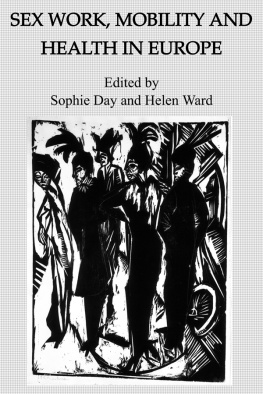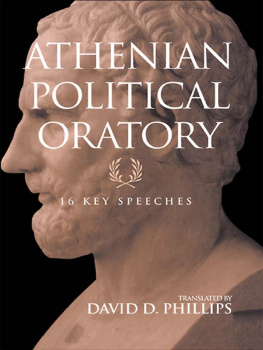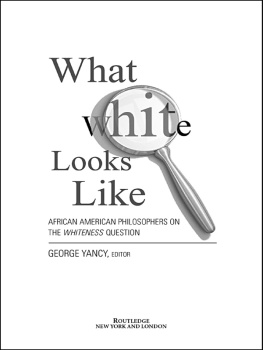SEX WORK, MOBILITY AND
HEALTH IN EUROPE
Major changes have taken place in the sex industry in Europe. Over the past decade we have seen increasing migration and diversification, along with major shifts in policy towards the industry. There is very little published on sex work in Europe, but the demand is growing for information and analyses of the situation today from people working on health, policy, gender and employment.
The authors of this book examine sex work in terms of economic and social restructuring, concerns about infection and recent policy developments on prostitution.
KEGAN PAUL
EUROPEAN STUDIES SERIES
THE BATTLE OF THE SINGLE EUROPEAN MARKET
Gilles Grin
SEX WORK, MOBILITY AND HEALTH IN EUROPE
Sophie Day and Helen Ward
SEX WORK, MOBILITY AND
HEALTH IN EUROPE
Edited by
Sophie Day and Helen Ward
First published in 2004 by
Kegan Paul Limited
Published 2013 by Routledge
2 Park Square, Milton Park, Abingdon,Oxon OX14 4RN
711 Third Avenue, New York, NY 10017, USA
Routledge in an imprint of the Taylor & Francis Group, an informa business
Kegan Paul, 2004
All Rights reserved. No part of this book may be reprinted or reproduced or utilised in any form or by any electric, mechanical or other means, now known or hereafter invented, including photocopying or recording, or in any information storage or retrieval system, without permission in writing from the publishers.
British Library Cataloguing in Publication Data
A catalogue record for this book is available from the British Library.
ISBN 978-0-710-30942-6 (hbk)
Library of Congress Cataloging-in-Publication Data
Applied for.
Contents
Helen Ward and Sophie Day |
Helen Ward and Sophie Day |
Jo Doezema |
Ana Lopez and Jenn Clamen |
Maya Czajka |
Pia Covre |
Laura Ma Agustn |
MAIZ |
Thrse van der Helm |
Rudolf Mak |
Sophie Day and Helen Ward for Europap |
Sophie Day and Helen Ward |
Hilary Kinnell |
Liv Jessen |
Don Kulick |
Jan Visser, with Arne Randers-Pehrson, Sophie Day, Helen Ward, |
Priscilla Alexander |
Tables and Figures
This book is one result of determined efforts to build networks through which a wide variety of activists can communicate effectively in Europe. In particular, we would like to acknowledge the central contribution of many sex workers, for ensuring that these networks focus on change to secure occupational, civil and human rights.
As editors of this volume, we would like to thank the contributors, members of the Europap network, participants in and sponsors of the conference we held in 2002, Sex work and health in a changing Europe. We thank the European Commission for support towards several contributions in this volume (European Programme of Community Action on Prevention of AIDS and other certain communicable diseases Grant agreement number: SPC.2002288), and also the Wellcome Trust for support towards (Grant number 053592).
We are grateful to Judith Kilvington, Pascale Martin and Keith Hassell for their administrative and technical support, and to Mark Hoskisson for preparing the index.
Sophie Day and Helen Ward
Laura Agustn has a doctorate from the Pavis Centre for Cultural Studies at the Open University (UK). Her research, which will be published as a Zed Book later this year, concerns the connections between migrations of non-European women to Europe, where they sell domestic, caring and sexual services, and the large social sector which proposes to help them. She has worked extensively in education popular both in Latin America and with migrants in various parts of the west and has been an evaluator of social programming for the ILO and the European Commission. She moderates an e-mail list on the sex industry in romance languages. Contact: laura@nodo50.org
Priscilla Alexander has been involved in the sex workers' rights movement since 1976, when she began working with COYOTE in San Francisco. In 1986, she co-founded CAL-PEP, a sex workers' HIV prevention project, going on to work on the issue of sex work and HIV/AIDS for the World Health Organization from 1989 to 1993. Since 1995, she has been working for FROST'D, an HIV/AIDS prevention project in New York City, analysing data. Along the way, she co-edited Sex Work: Writings by Women in the Sex Industry, and has authored several papers on various aspects of sex work.
Jenn Clamen has been actively involved with the sex workers movement for four years. Originally from Canada, she spent two years in London, UK actively organizing with the International Union of Sex Workers (IUSW). She now resides in Montreal, Quebec and continues her work with the IUSW as a Canadian representative. Contact: jennifer.clamen@sympatico.ca
Maria Pia Covre, an unrepentant prostitute, was born in Milan and lives in Pordenone, Italy. In 1982, with Carla Corso and other prostitutes, she founded the Committee for the Civil Rights of Prostitutes. She has since become well known for her many initiatives aimed at raising public and political awareness concerning the reality of prostitution and the needs of women prostitutes. A tireless and tenacious activist, she has privately confessed that working as a prostitute was for her a very gratifying experience.
Maya Czajka has been a member of the Board of Directors of the German AIDS-Association since 1999, with responsibility for women's affairs and a range of other issues including the sex industry, drug use and people in prison. A former sex worker, she has been involved in the EUROPAP network since its beginning in 1993. Nowadays her freelance assignments include management consultancy, the provision of expert opinion for family courts, and training in HIV and STI prevention.
Sophie Day is an anthropologist at Goldsmiths College London. She helped found the Praed Street Project in 1986 and has carried out extensive research into the sex industry, both in the UK and Europe. She co-ordinated Europap with Helen Ward (1998-2000), and then became research co-ordinator of the network (2000-2003).
Jo Doezema has worked in the field of gender and development as a policy consultant, researcher and advocate for over a decade, with a specialisation in the areas of sex work, HIV/Aids, feminism and trafficking in women. She is co-editor of the first book to profile the international sex worker rights movement: Global Sex Workers: Rights, Resistance and Re-definition (Routledge 1998). Currently, she is carrying out research at the Institute of Development Studies at the University of Sussex, Great Britain, examining the historical development of contemporary debates on trafficking in women. She is the board member for migration of the Network of Sex Work Projects, an international NGO which advocates for the human rights of sex workers. She is also a sex worker, with experience in exotic dancing and street, brothel, escort and window prostitution.







